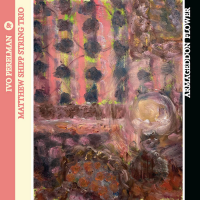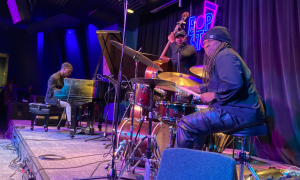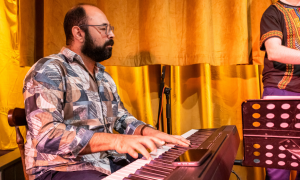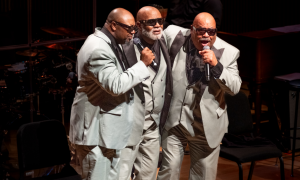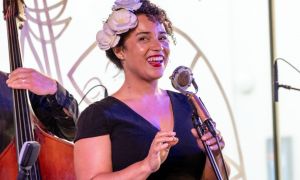Home » Jazz Articles » Live Review » Blue Note 70th Anniversary Tour at the Kimmel Center
Blue Note 70th Anniversary Tour at the Kimmel Center
The whole package was highly successful and much appreciated by the audience because it captured the driving, forceful sound that was the signature of the best Blue Note recordings.
Kimmel Center for the Performing Arts
Verizon Hall
Philadelphia, Pennsylvania
March 28, 2008
The legendary Blue Note record label is celebrating its 70th Anniversary this year. To briefly summarize its history and achievements, one can do no better than to quote from the Wikipedia entry on the subject:
"Blue Note Records is a jazz record label, established in 1939 by Alfred Lion and Max Margulis. Francis Wolff became involved shortly afterwards. [Wolff also took the photos that were on many of its famous album covers.—Eds.] It derives its name from the characteristic "blue notes" of jazz and the blues. Blue Note Records is currently owned by the EMI Group and in 2006 was expanded to fill the role of an umbrella label group bringing together a wide variety of EMI-owned labels and imprints specializing in the growing market segment of music for adults.
"Blue Note throughout its history has principally been associated with the 'hard bop' style of jazz (mixing bebop with other forms of music including soul, blues, rhythm and blues and gospel). 
Horace Silver
piano1928 - 2014

Jimmy Smith
organ, Hammond B31925 - 2005

Freddie Hubbard
trumpet1938 - 2008

Lee Morgan
trumpet1938 - 1972

Art Blakey
drums1919 - 1990

Lou Donaldson
saxophone1926 - 2024

Donald Byrd
trumpet1932 - 2013

Grant Green
guitar1935 - 1979
The Blue Note 7 is a group of high-power musicians associated with the record label (although not necessarily most frequently recorded by them) who have come together to honor the record company and its musical legacy. Currently, they are on a tour of concert halls and other venues, and they have just produced one album, Blue Note 7 Mosaic, released of course on the famed label. In this concert at the Kimmel Center, they remained faithful to the hard bop legacy, selecting a series of tunes from Blue Note's heyday, with references to Art Blakey and the Jazz Messengers, Horace Silver, 
Wayne Shorter
saxophone
1933 - 2023
Thelonious Monk
piano
1917 - 1982
McCoy Tyner
piano
1938 - 2020
Cedar Walton
piano
1934 - 2013
At the Kimmel Center, the group performed straight through without an intermission. The musicians appeared in corporate-style business suits that mostly recalled the professionalism of the Modern Jazz Quartet and stood in contrast to the colorful and casual outfits that many groups sport today. Their attire forecast their straight-ahead hard bop-derived approach to the music, delivered in a taut, high-wired manner propelled by drummer 
Lewis Nash
drums
b.1958
Bill Charlap
piano
b.1966
Peter Washington
bass
b.1964
Peter Bernstein
guitar
b.1967
Nicholas Payton
trumpet
b.1973
Ravi Coltrane
saxophone, tenor
b.1965
Steve Wilson
saxophone
b.1961
Rudy Van Gelder
various
1924 - 2016
The evening began with a rendition of Horace Silver's "The Outlaw," well-arranged and delivered with a clean, sharp sound, with a fine alto solo by Wilson and rapid right-hand runs by Charlap a la Silver. Charlap alertly edged forward from his seat, and his well-honed playing was stunning throughout. The legacy of Art Blakey's Jazz Messengers was acknowledged with Wayne Shorter's "United" arranged by 
Renee Rosnes
piano
b.1962
McCoy Tyner's classic "Search for Peace" from The Real McCoy was highlighted by a beautiful trumpet solo by Payton and a flute solo by Wilson, and constituted ballad relief from the rapid fire pace of the other numbers. The set concluded with Cedar Walton's "Mosaic," with glowing solos by Coltrane, Wilson, Payton, and Charlap. Nash's concluding drum solo was remarkable for its musical intelligence, powerful technique, and creative force. Payton mentioned, in connection with his survey of the audience about which Philly steak joint is the best (Gino's, Pats, or as one audience member added with a shout, "Jims!"), noted that Nash is a vegetarian. If his youthful appearance, Zen-like focus, and concentrated energy come from his diet, we should all be vegans!
For an encore the group performed Philadelphia legend Lee Morgan's "Party Time" in a fine arrangement by (Peter) Bernstein. The surprise of the evening came when Nash scat sang a solo. If Roy Haynes is any indication, drummers may harbor profound wishes to be vocalists. Nash did quite well at it.
Tags
Comments
PREVIOUS / NEXT
Support All About Jazz
 All About Jazz has been a pillar of jazz since 1995, championing it as an art form and, more importantly, supporting the musicians who make it. Our enduring commitment has made "AAJ" one of the most culturally important websites of its kind, read by hundreds of thousands of fans, musicians and industry figures every month.
All About Jazz has been a pillar of jazz since 1995, championing it as an art form and, more importantly, supporting the musicians who make it. Our enduring commitment has made "AAJ" one of the most culturally important websites of its kind, read by hundreds of thousands of fans, musicians and industry figures every month.







 Buy Now
Buy Now


